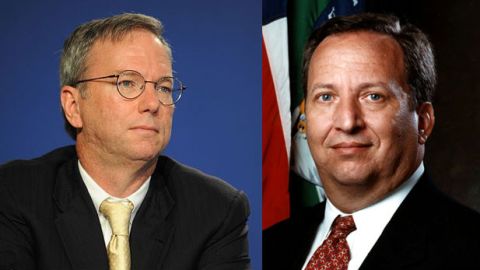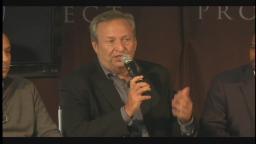Larry Summers: Conscience is the Knowledge That Someone is Watching

Sponsored by:
With the global financial crisis ongoing, the concept of “short-termism” has emerged as one underlying explanation for our current woes. As the argument goes, the increasing emphasis on quarterly reports and returns can drive CEOs and investors to make decisions that are not necessarily in the best, long-term interests of companies or the economy as a whole.
The question of short-termism was the subject of a lively panel at The Nantucket Project, a festival of ideas held on Nantucket, Massachusetts this month. The panel was stacked with financial heavyweights Eric Schmidt, Executive Chairman of Google, Larry Summers, Former Treasury Secretary and President of Harvard University, Hedge Fund Manager Eddie Lampert, venture capitalist Stephen DeBerry and Mellody Hobson, President of Ariel Investments. The panel was moderated by Tom Stewart, Chief Knowledge Officer at Booz and Company. The full panel can be viewed here.
The highlights in this post bellow follow an exchange between Larry Summers and Eric Schmidt, in response to Tom Stewart’s question about whether it is difficult for a CEO to embrace the long view if he has to live and die quarter-by-quarter. Schmidt immediately turned this question back to the panel and audience, by posing the rhetorical question, “How long is the future?”
Watch Eric Schmidt here:
Next, Moderator Tom Stewart turned to Larry Summers. If the political leadership takes the short-term view of 2 and 4 and 6-year election cycles, as Schmidt argued, is government biased in favor of “jam today or jam tomorrow?”
In defending government action, Summers pointed to examples of great foresight, including national parks, conservation, investments in basic research, war memorials, and the Bill of Rights “that has guided society for 250 years.”
Watch Larry Summers respond here:
Is there inadequate accountability in America today, as Summers suggested? If so, how do we get people’s interests aligned with the long-term goals we want to achieve? Google Executive Chairman Eric Schmidt had this response to Summers:
What will influence people to behave responsibly beyond compensation systems?
Larry Summers, paraphrasing Kenneth Galbraith, said that ‘conscience is the knowledge that someone is watching.’ According to Summers, that applies to President Obama’s health care plan, as well as Schmidt’s tenure as CEO at Google.
Larry Summers gets the last word here:




